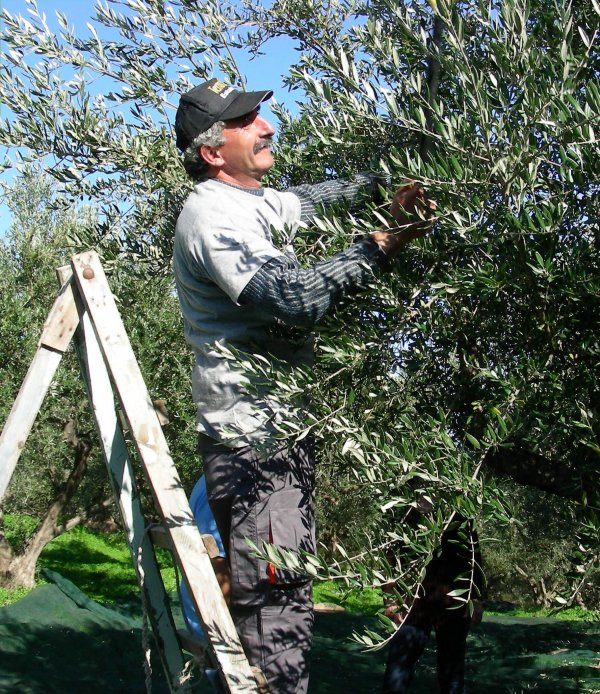Ruohonjuuri's olive oils are bird friendly

The production of olive oils sold at Ruohonjuuri does not harm birds!
The nightly “vacuuming” type of olive harvesting causes millions of bird deaths in the Mediterranean region each year. Birds sleeping in the trees get confused by the bright lights of the harvesters and get sucked inside them in tragic numbers. During the day, birds know how to look out for machines, but unfortunately a large part of the “vacuuming” of olives is carried out at night, as cooler temperatures help the aromas to be better preserved. The vacuuming method is most commonly used on the farms of giant producers where operational efficiency is fine-tuned to the maximum. Fortunately, in the minds of Ruohonjuuris olive oil producers, extreme efficiency is not the main thing at all: ethical and ecologically sustainable practices and ensuring high quality are much more important.
In the production of olive oils sold at Ruohonjuuri, therefore, birds are not harmed: in the case of our oils, olives are not harvested at all by vacuuming methods but in a way that is gentler both to birds and to olive trees.
Bio Planete's olive oils are collected using rakes and vibration technology
Bio Planete, which supplies organic olive oil for Ruohonjuuri, is well aware of the harm caused to birds, which has also been a topic of recent active discussion in Central Europe. Olives used in the Bio Planete series olive oils are only collected using responsible methods, and the harvest does not cause any harm to birds. Olives pressed into Bio Planete olive oils are harvested using rakes or vibrating "machines". With these methods, the olives simply fall into a net or sunshade, from which the pickers then recover the olives. Bio Planete olives are only collected during the day, guaranteeing night peace for birds and other wildlife. For example, in Bio Planet’s olive groves in Tunisia, the entire crop is harvested entirely by hand during the day. Italian plantations, on the other hand, use vibration technology. Italian olive groves have been grown for decades, so the trees there are particularly large and grow partly in rocky and hilly terrain. “Vacuuming machines” used in intensive production wouldn’t even get there!
The olives used in Terra Creta’s and Puhdistamo’s olive oils are collected with sticks
Terra Creta’s and Puhdistamo’s olive oils production does not harm birds at any stage of the harvesting or production of the olives. The olives are picked by hand, aided by hand-held sticks that allow the olive to be dropped into a net placed under a tree. From the net, the olives are sorted by hand and delivered to the oil extraction plant within a few hours. Every stage of production is completely transparent. In addition, Terra Creta is the only olive oil that the consumer can personally trace from the tree to the bottle on Terra Creta’s website. You can see, e.g., the date of production, laboratory results and exact area from which the olives in that bottle come from.
At no point in the cultivation of Terra Creta’s olives or in the production of olive oil are birds harmed or vacuum collection used. The Puhdistamo series olive oils come from Terra Creta’s farms, so the same naturally applies to these quality oils as well.
Terra Creta's main idea is to operate on a sustainable basis at every stage of production, and to be self-sufficient, creative, and ecologically aware. Terra Creta's activities respect the environment in many ways. For example, olive wash water is used to irrigate trees, olive leaves are used to feed nearby animals, olive-pomace is used for energy production, production facilities are illuminated by solar energy, and the olive crop is gently harvested by hand.
Olive harvesting in Terra Creta’s olive grove.
Olives used in the Foodin series olive oils are harvested by raking
Foodin olive oils use olives that are harvested from the trees by raking. Thus, vacuuming is not used at all in harvesting. The Foodin folk have visited the olive groves themselves to get acquainted with the details of production, and are 100% sure of the ethics and high quality of the operation.
“We have a warm relationship with our olive oil producers,” says Maria from Foodin.
Foodin’s olive oil is produced by a Cretan family business that has been producing olive oil for over a hundred years with love and unmatched know-how. The orchards of the olive oil producer with long traditions are located at an altitude of 100 to 200 meters above sea level. Naturally, the olive trees have been planted many generations ago.
The Koroneiki-olives used in Foodin olive oil are harvested gently by raking, while respecting birds and other wildlife. The olives are collected in sacks or metal containers and not stacked on top of each other. Compression takes place within days of harvesting.
All olive oils sold in Ruohonjuuri are organically certified, and therefore do not use chemical fertilizers or pesticides. Organic quality is also good for both birds and nature in general.
